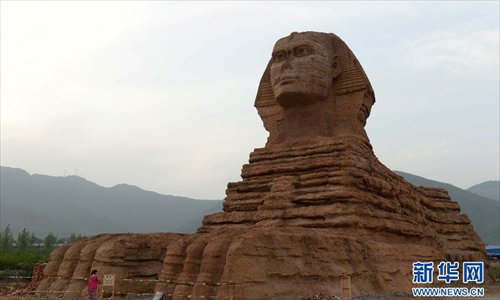HOME >> CHINA
Egypt attacks copycat Sphinx
By Cathy Wong Source:Global Times Published: 2014-5-25 23:38:01

The copycat construction of the Great Sphinx of Giza in Hebei Province Photo: Xinhua
Architects and urban planners have raised questions over the lack of creativity in Chinese buildings once again after an unauthorized copycat construction of the Great Sphinx of Giza in Hebei Province caused international attention and backlash from the Egyptian government.
Egypt's Ministry of State for Antiquities has filed an official complaint to UNESCO in objection to China's unauthorized full-size replica of the Great Sphinx of Giza in Hebei Province, Egyptian newspaper Al-Ahram Weekly reported Thursday.
The ministry has sent an official letter to Egypt's permanent envoy at the UN Mohamed Sameh Amr over China's breach of UNESCO's World Heritage Convention in 1972, Minister of Antiquities Mohamed Ibrahim was quoted as saying to Al-Ahram Weekly.
China and Egypt are both state parties to the convention, and should not "take any deliberate measures which might damage directly or indirectly the cultural and natural heritage," according to the convention.
The replica, according to Ibrahim, harms the cultural heritage of Egypt, where the statue is registered on the World Heritage List. He called the construction "a bad imitation that disfigures the original."
Egypt will also discuss the matter with the foreign ministry through the Chinese Embassy in Cairo, he added.
The copycat Sphinx measures about 60 meters long and 20 meters high, and is about the same size as the original.
According to a representative of the production company in charge, the replica is a "temporary construction for movies and television sets," and will be demolished as soon as the filming is over, China News reported on Sunday.
The UNESCO convention has no legal binding force, and the Chinese government will not be held responsible for the complaint, Xue Lei, an international law expert at the Shanghai Institutes for International Studies, told the Global Times.
"The construction was initiated by a private company, therefore the Egyptian government can only sue the company through China's domestic courts, Xue told the Global Times.
Urban planning experts attributed the nationwide prevalence of copycat constructions to a lack of originality and respect for culture and history, Xu Ke, an engineer at the Beijing Tsinghua City Planning Research Institute, told the Global Times.
Imitations of iconic sites are common in China, such a mock Eiffel Tower recreated in a town near Hangzhou. A facsimile of the US White House was also used for a Shanghai court building.
Copycat constructions save time for planning and design, the phase most important and time-consuming for the whole project.
Architects and engineers' creative space is also suppressed when the investors impose their standards of design, preferring Western aesthetics over oriental designs, Xue noted.
Newspaper headline: Hebei monument prompts dismay from architects
Posted in: Society